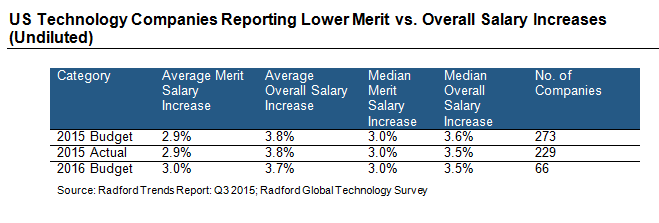The difference between merit budgets and overall salary increase budgets is often cash set aside to provide exceptional raises for top performers. Yet, this figure is often underreported.

US-based technology and life sciences companies usually maintain very consistent merit-based salary increase budgets of around 3% each year, on average. While that merit budget encompasses all employees that are expected to receive a raise related to performance, those companies that supplement their merit pool with additional funds for adjustments and promotions report an overall budget that is consistently around 1% higher than their merit increase budget alone. While that difference may sound small, it can translate to meaningful dollar figures when we consider the amount is 1% of a company's total salary payroll shared among a subset of employees.
In the quarterly Radford Trends Reports, the difference between the average merit increase and average overall budget increase from all companies reporting rests closer to 0.4% for technology companies and 0.5% for life sciences companies. This figure is diluted downward because it includes companies that report the same figure for merit and overall budgets. When we look only at companies that reported different merit and overall budgets/awards, the average is around 0.9% for technology and life sciences companies as seen below (by subtracting the percentages of the overall salary increase from the merit salary increase). Notably, the difference between the median merit value and the median overall value among the companies reporting different figures is 0.6% for the 2015 budget figures and 0.5% for 2015 actuals among technology companies. The difference in medians is 1% for life sciences firms. This suggests that a small number of technology companies are allocating well above 0.9% of their overall budget to exceptions — thus, raising the average above the median practice.


Interestingly, nearly the same number of life science companies report duplicate merit and overall budgets as do the companies reporting higher overall budgets if we compare the company totals in the life sciences chart above and the one below. On the other hand, by looking at both technology-specific charts, we see a higher rate of technology companies reporting the same merit and overall budgets than those that say their overall budget is higher.


We believe more companies have set aside money to provide employees through promotions or equity adjustments than the survey data reflects since these actions may be funded "off budget" or by using a separate pool of funds. Exceptional, off-cycle raises may be granted to top performers, which companies don't anticipate or factor into their overall budget.
Certain employee skill sets are in high demand in the fast-changing technology and life sciences fields, and human resources professionals are challenged to identify and compensate their top performers. Creativity by managers is needed to address retention and reward recognition: some options include reducing the number of employees receiving token increases so that top performers receive outstanding merit-based raises by increasing the amount of their raise. If a large number of employees receive adjustments or promotions, focusing on key employees within that cohort could offer top recipients even larger awards (e.g. a 12% raise for 8% of the population vs. a 10% increase for 10% of the population). Timing can be used as a tool as well with some employees granted raises outside of their normal salary review schedule.
It's easy to understand why exceptions to normal salary reviews are being taken in today's competitive marketplace. Planning ahead and fully funding increases for key employees is important. We believe a best practice is to hold back part of the merit increase in your budget cycle for special actions so that your company has a better total picture of salary increases for all employees. Underestimating the total amount spent on merit-based salary increases can negatively impact future budget planning and cause misappropriations in other areas of the human resources budget.
To learn more about participating in a Radford survey, please contact our team. To speak with a member of our compensation consulting group, please write to consulting@radford.com.
Related Articles